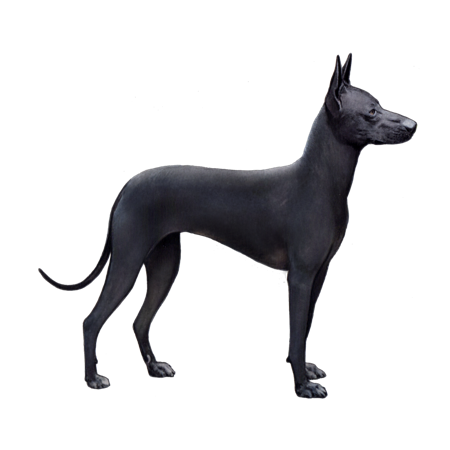
Miniature Schnauzer
The Miniature Schnauzer is an intelligent, active, and eager-to-please breed. These devoted, loyal, and affectionate pups are the ultimate trusty companions. In addition to being excellent family pets, Miniature Schnauzers make exceptional, alert watchdogs.
Interested in discovering if your dog is a Miniature Schnauzer?
Check out Wisdom Panel's DNA tests.

Miniature Schnauzer Traits
General Appearance
Though small, the Miniature Schnauzer is a sturdy, hearty dog that is resilient, muscular, and brave.
Coat and Colouring
The Miniature Schnauzer has a wiry outer coat with a close undercoat. The AKC standard recognizes three colors: black, black and silver, and salt and pepper. The hairs in the salt and pepper coat consist of black and white banded hairs, as well as solid black and white hairs in the topcoat.
Distinctive Physical Traits
Mini Schnauzers have bushy eyebrows that frame their dark eyes, and long, thick beard and whiskers that grow around their noses and on their chins. In fact, this breed owes its name to its distinctively furnished muzzle. Schnauzer comes from the German word, "schnauze," which means muzzle or snout.
Miniature Schnauzer Temperament
Smart, lively, and ever watchful, the Miniature Schnauzer is a versatile dog—comfortable both in the home and on the farm. They're friendly toward kids and other animals and like to play hard. Overall, they're a very good-natured dog.
The Miniature Schnauzer's world revolves around its home and family, which only enhances its skills as a good watchdog. These tenacious terriers may chase or bark at wildlife. And once something has captured their attention, it can be challenging to distract or disengage them.


Miniature Schnauzer History
Breeders created the Miniature Schnauzer by crossing the larger Standard Schnauzer with smaller dogs. These included the Affenpinscher, Miniature Pinscher, and Poodle.
The resulting breed worked on farms hunting rats and other vermin and guarding (very small) flocks. Most people didn't consider the Miniature Schnauzer to be an actual breed until 1899.
Mini Schnauzers arrived in the United States in 1925, and the American Kennel Club recognized the breed in 1926. Following World War II, the dog's popularity soared. At one time, Mini Schnauzers were the third most popular breed in America.
Miniature Schnauzer Care
Nutrition
Miniature Schnauzers require a high-quality, age-appropriate dog food. It can be commercially manufactured or homemade (under a veterinarian's supervision and approval).
It's essential to carefully monitor the amount of food you feed your Mini Schnauzer and reduce portions if your pup gains weight. Also, remember that giving too many treats in addition to regular meals can contribute to obesity.
Grooming
Although Miniature Schnauzers don't shed much, their coats require frequent brushing, combing, and grooming to look their best. As long as your Mini Schnauzer doesn't get into something too dirty or smelly, monthly baths are often enough to keep them clean and tidy.
Monthly nail trims and weekly ear checks (to tackle bothersome debris or wax buildup) are also necessary.
Exercise
Lively and fairly energetic dogs, Miniature Schnauzers require regular daily exercise—including games and tricks—to satisfy their mental and physical needs. They benefit greatly from enclosed areas where they can run and play with their people. These pups also enjoy canine sports such as agility, tracking, earthdog trials, rally, and competitive obedience.
Miniature Schnauzers have a strong prey drive and are likely to chase after small animals. So, it's best to keep them on a leash when they're out and about.
Training
The Miniature Schnauzer tends to be suspicious of strangers and may require careful socialization to prevent or reduce any defensive, aggressive tendencies.
They can also benefit from puppy training classes. It's best to start firm, consistent, and gentle training at an early age. Reward-based training involving food or games works well for this breed.

Miniature Schnauzer Genetic Health Conditions
-
Chondrodystrophy (CDDY) and Intervertebral Disc Disease (IVDD) Risk
Chondrodystrophy (CDDY) is a skeletal disorder characterized by shortened limbs and abnormal early degeneration of the spinal discs, or intervertebral disc disease (IVDD), which predisposes to disc herniation.
-
Demyelinating Neuropathy
Demyelinating Neuropathy is a progressive neurodegenerative disease, causing noisy breathing, regurgitation and mild exercise intolerance.
-
Myotonia Congenita (Discovered in the Miniature Schnauzer)
Myotonia congenita is a muscle disorder that affects dogs from birth, causing stiff movement and delayed relaxation of muscles after exercise.
-
Persistent Müllerian Duct Syndrome
Persistent Müllerian Duct Syndrome (PMDS) is a disorder of sexual development affecting male dogs, where a uterus and other female sex organs develop in otherwise externally normal-appearing male dogs.
-
Spondylocostal Dysostosis
Spondylocostal Dysostosis is a developmental disease that leads to skeletal abnormalities often noted at birth.
-
X-Linked Progressive Retinal Atrophy 2
X-Linked Progressive Retinal Atrophy 2 (XLPRA2) causes early-onset degeneration of the light detecting retina at the back of the eye, resulting in loss of vision.
Knowing if your Miniature Schnauzer is a carrier or at-risk for these conditions can help you and your veterinarian plan for your pup's lifelong care. With Wisdom Panel™ Premium, you can get results for over 200 genetic health tests.
Breed Group
Terrier
The Terrier Group ancestors were bred to hunt and kill vermin. They are often characterized as feisty and energetic dogs whose sizes range from fairly small to much larger.
Resources
https://www.akc.org/dog-breeds/miniature-schnauzer/
https://vcahospitals.com/know-your-pet/dog-breeds/miniature-schnauzer
Reviewed 26 July 2020 by Annette Louviere, DVM





















































